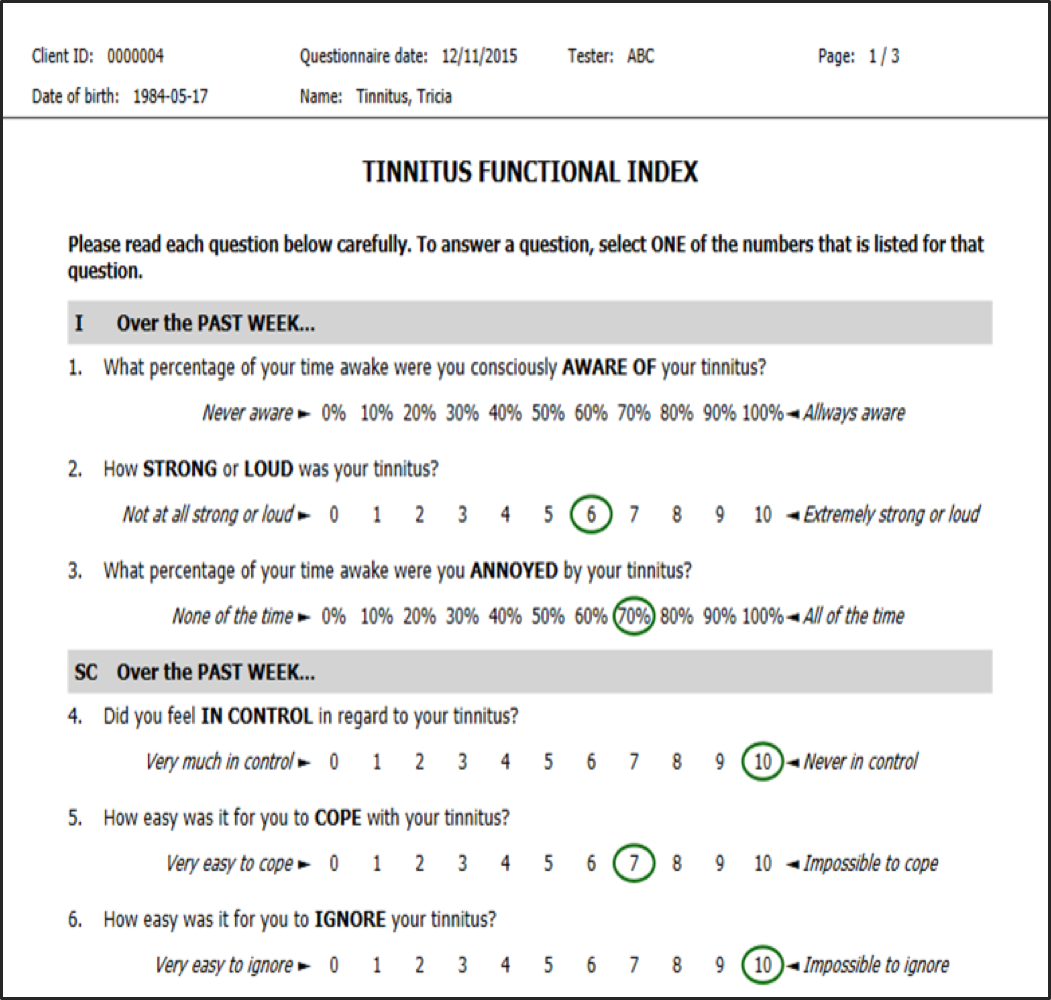Question
What does a comprehensive tinnitus evaluation comprise of?
Answer
The comprehensive tinnitus evaluation is comprised of the following components:
- Hearing assessment
- Questionnaires
- Tinnitus evaluation
Hearing Assessment
The hearing assessment is a multi-step process. First, we start with a case history/tinnitus intake interview. We obtain medical referrals as needed. As an audiologist, you are within your scope of practice to see patients without a medical referral. However, 10 to 15% of the population currently has some sort of tinnitus, and about 0.4% are significantly bothered by it. Subjective tinnitus is where patients hear ringing in their ears, with no identifiable sound source. It may be caused by hearing loss, or perhaps not. For those patients, we have to rule out any vascular, muscular, skeletal, or respiratory structure-function issues. That's where medical referrals may be necessary.
We must also conduct an audiometric evaluation, which is important to test high frequencies, in particular at higher resolutions around where the tinnitus is suspected. Rather than the interoctaves that are commonly done at 2000, 3000, 4000 Hz, it is helpful to break down those frequencies into something a little bit smaller, like 4010 Hz, 4020 Hz, 4030 Hz. In addition, a total MCL and UCL can be beneficial during that evaluation process. Another part of the hearing assessment involves immittance measures and otoacoustic emissions. OAEs are a sensitive indicator of cochlear damage beyond what is seen on the behavioral audiogram. Often, we see OAEs affected before we see it on an audiogram.
Questionnaires
Some commonly used tinnitus questionnaires include:
- Tinnitus Functional Index
- Tinnitus Handicap Inventory
- Tinnitus & Hearing Survey
- Beck Depression Inventory
- Spuelberger State-Trait Anxiety Inventory
- Primary Care PTSD Screen
The first three questionnaires are commonly used: the Tinnitus Functional Index (TFI), the Tinnitus Handicap Inventory (THI), and the Tinnitus and Hearing Screening (THS). The last three inventories (Beck Depression Inventory, the State-Trait Anxiety Inventory, and the Primary Care PTSD Screen) are listed because approximately 35% of our patients with tinnitus have anxiety, between 13 to 28% of tinnitus patients have depression, and 33% approximately have insomnia. About 25% of our patients have some sort of comorbid psychiatric disorder, and about 33% of our patients with tinnitus have some sort of PTSD or Post Traumatic Stress Disorder. These inventories are a great way to help screen these patients. They might be coming to you because of the ringing in their ears, and they might not associate that with their insomnia or their anxiety. As hearing care practitioners, we can help make that connection and start that conversation with them.
Two other inventories that might be useful: the Six Item Cognitive Impairment Test (6CIT) and the General Practitioner Assessment of Cognition (GPCOG). These questionnaires are geared more at cognition and memory issues. It does fall within the scope of practice for an audiologist to administer these inventories. However, if you're not comfortable doing that, by all means, defer it to another professional. Bring it up with the patient's general physician. If you're working in conjunction with an otolaryngologist, mention it to them and they can introduce these topics. That being said, these additional inventories are nice to have in your back pocket, especially when you suspect something else is going on.
The Tinnitus Functional Index (TFI) is one of the newer questionnaires that has come out. It consists of 25 questions covering eight sub-scales. It includes sleep disturbance, relaxation, and quality of life. Similarly, the Tinnitus Handicap Inventory (THI) is also a 25-question inventory used to assess the patient's self-reported perception of how much their tinnitus influences their life. Both of those are good questionnaires to administer because they don't take terribly long. In addition, they've also been heavily researched and peer-reviewed. The Tinnitus Hearing Survey (THS) consists of 10 questions. It's helpful as a supplemental inventory, but it's not validated as a primary outcome measure. I would strongly caution you against using that as your only source of a tinnitus questionnaire.
We have three tinnitus questionnaires built into our system that can be accessed through Noah: the TFI, the THI, and the THS. Figure 1 shows an example of the TFI. This is a screenshot from our Astera² Tinnitus Module. You can print this out and have the patient complete it on paper, or they can answer these questions on a touchscreen. If they complete it online, the system will score it for you and break down the patient's answers into separate categories.

Figure 1. Tinnitus Functional Index (TFI).
Tinnitus Assessment
To reiterate, the following components are traditionally included in the overall tinnitus evaluation:
- Hearing Assessment
- Case History/Tinnitus Intake Interview (Questionnaires)
- Medical Referrals
- Otoscopic Examination
- Audiometric Evaluation
- High Frequencies
- High Resolution around Tinnitus
- Interoctaves
- MCL & UCL
- Immittance
- Otoacoustic Emissions
- Questionnaires
- Tinnitus Evaluation
When we're talking about the actual tinnitus assessment, the four key indicators are pitch matching, loudness matching, minimum masking level and residual inhibition. These indicators are important to keep in mind whenever we're billing for tinnitus. The CPT code to use for tinnitus assessment (which includes pitch, loudness, matching, and masking) is 92625. If you're only doing one ear, you will need to use the 52 modifier with that. Again, after today's general overview, if you want more detail on how to perform each of these indicators, I would strongly encourage you to check out the white papers that we've attached to this presentation, as well as the resources at the end.
This Ask the Expert is an excerpt from the text course, Tinnitus Toolbox. For more information please visit please visit www.otometrics.com or the Otometrics Partner Page on AudiologyOnline.

